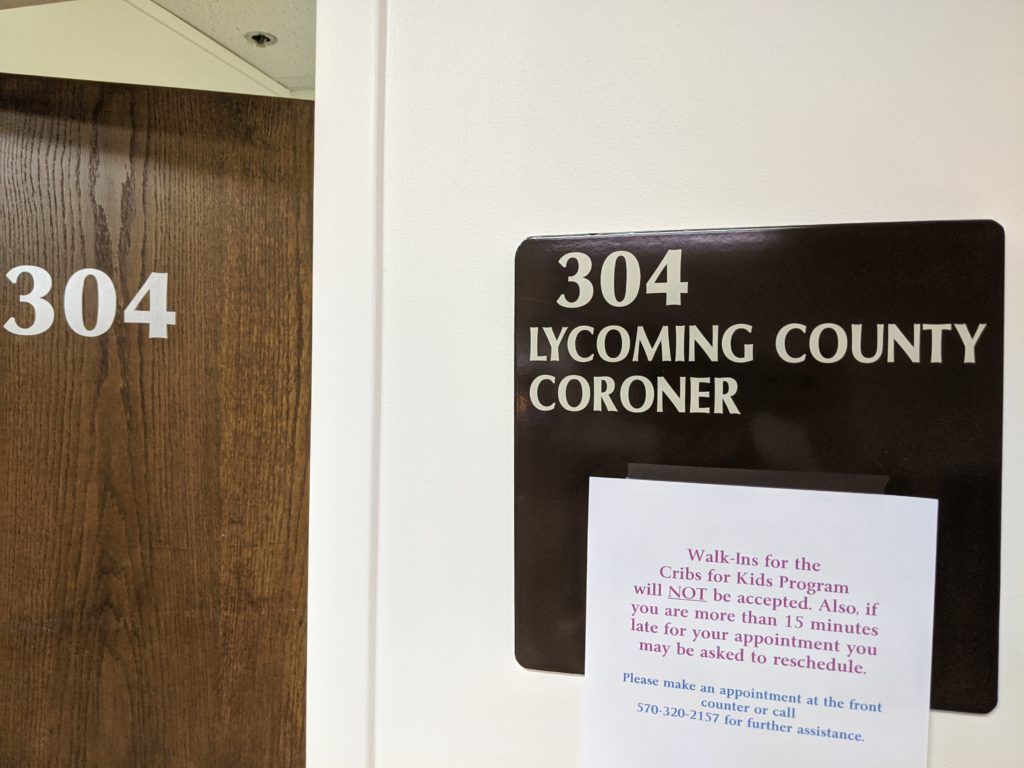
COVID-19 has touched nearly every person in Pennsylvania. To better understand how the viral disease is transmitted, coroners throughout the state are researching not only how it interacts with the living, but also the deceased.
We cannot adequately prevent or respond appropriately to future outbreaks if we don’t learn everything possible from the first one,” said Dr. Terrance Lynn, deputy coroner for Montour County. “Just because a patient has died, doesn’t mean we should stop caring for them or understanding what led to their death. A deceased patient is just as important as a living one.”
In Pennsylvania, positive cases have hit 32,000, with over 1,100 deaths. In Lycoming County there are 36 confirmed cases.
According to Lynn, it is important to test living and deceased patients to understand how wide the infection is as well as it’s mortality.
He added that it is also important to test deceased patients because we need to limit any possible spread of the virus to those who are involved in the next steps of care. Moreover, it highlights the importance of the immediate need for hospital systems to work with coroners.
This research has had its challenges. According to Charles Kiessling Jr., Lycoming County coroner, testing of the deceased has been difficult, with some labs refusing to test the deceased unless there is a significant exposure to healthcare workers, EMS, Fire or Law enforcement personnel.
“Due to the problem of getting deceased tested, many coroners have purchased bedside testing kits from Premier Biotech and are using this technology for screening of possible positive decedents.”
Dr. Terrance Lynn, deputy Coroner for Montour County, explained the testing in lay terms.
“This test is a ‘point of care’ test, meaning it is performed at the patient’s bedside and results are present within minutes of running the test. Premier Biotech’s COVID-19 test analyzes COVID-19 IgM and IgG specific antibodies within a patient.
An antibody is the protein that immune cells make after exposure to an antigen (Bacteria, fungi, and viruses, pollen, etc.) A Positive IgM (the initial antibody any immune response forms and is a pentameric shaped antibody) and negative IgG antibody result means the patient is acutely infected. A Positive IgM and Positive IgG means the patient has had recent infection and is developing a lifelong (theoretical) protecting antibody (the IgG). A Positive IgG and a Negative IgM antibody result means the patient has a resolved COVID-19 infection and now has lifelong (theoretical) immunity.”
According to Lynn, the purpose of using this kind of test is two-fold.
First, health professionals do not know how long the virus still is viable after death and this affects its ability to spread. Second, standard testing is very expensive, supplies are limited, and testing can take significant time.
This test is a more cost and time efficient alternative, as it only takes approximately 10 minutes.
“Also, “labs across the states have not studied taking a sample from a deceased person,” Lynn said, adding that getting approval to test deceased patients also is difficult, “which is a huge problem.”
Death changes the properties of all the cellular processes in the body and tissues begin to degrade, according to Lynn. He added that the specimen must be taken from the back of the nose and as a mucosal surface it is one of the fastest areas to degrade.
“Taking a sample from a deceased person with an unknown time of death would automatically fail the stability criteria and thus be rejected,” Lynn said.
Moreover, the molecular PCR test is expensive and coroner budgets cannot afford testing every death. Also, there are limited testing supplies for the PCR test such that swabs and the viral transport media are hard to come by and are being rationed to test living patients first.”
To help find a better method of testing for COVID-19 that is both cost effective and time efficient, Lynn is collaborating with the PA state coroners and is assisting in selecting a high-quality screening test. He is also involved with a verification study to demonstrate that this particular test, Premier Biotech COVID-19, is able to be performed on deceased patients.
“Our first deceased patient in the verification study was immunosuppressed, and still made enough antibodies to be detected. We have been testing known positive patients (Molecular test positive) and then comparing the Premier Biotech test and comparing if positive or not. So far, the results of our study have demonstrated 100% concordance with molecular findings. This allows us to use this test on unknown patients of which molecular testing has not been done (would be the case if they died at home etc.) and be able to rely on the results.”
The Premier Biotech test is of great interest to coroners for many reasons. It is inexpensive, rapid, requires no mixing or risk of aerosolization of the specimen. It also only requires a drop of blood, which is placed onto a test cartridge. A buffer is added to a different part of the cartridge and the specimen migrates across the cartridge. A visible red line is produced if the sample tests positive in the IgM or IgG and the results are available in 10 minutes.





